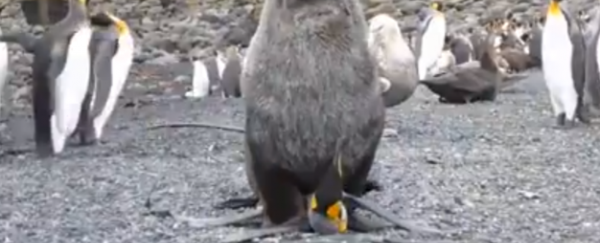In a tiny and remote place called Marion Island, in the chilly subantarctic region right down in the southernmost pole of the Earth, scientists have caught several fur seals trying to have sex with king penguins. And as much as we love the idea of a bunch of baby 'pengueals' hatching out of some giant eggs in two months, scientists have suggested that the act is more likely the result of sexual frustration than the burning desire to distribute its genes.
The behaviour was first witnessed on Marion Island in 2006 by mammalogist Nico de Bruyn from the University of Pretoria in South Africa. He watched, flabbergasted, as an Antarctic fur seal decided to go to town on a king penguin, and being several times bigger and heftier than the penguin, the fur seal had no problems at all squashing its 'mate' into submission for as long as he liked.
Since then, de Bruyn and his colleague William A. Haddad have seen two other such incidents across the island, and now, several years later, de Bruyn has seen the same thing happen again. He admits to Matt Walker from the BBC that, while not totally unexpected, the act still shocks him a little. "Honestly I did not expect that follow-up sightings of a similar nature to that 2006 one would ever be made again, and certainly not on multiple occasions."
De Bruyn suspects that rather than trying to desperately pass on its genes, the seal is probably just using the penguin as a release for all its pent-up sexual frustration. Or perhaps the act started out playful or aggressive between the two, but then accidentally turned sexual.
According to Walker, these four incidents are the only known examples of pinnipeds - the taxonomic group that includes seals, fur seals and sea-lions - trying to mate with a totally different kind of animal. And the researchers think that the incidents are actually increasing in frequency, which suggests that the behaviour is being learned among the young seals of the island.
"Seals have capacity for learning - we know this from their foraging behaviour for example," de Bruyn told the BBC. [But] "if this is learned behaviour, we really can't think of what the reward may be for these young males. Other than perhaps learning that these birds are an easier target to practice their copulatory skills."
Which is super-creepy and not nearly as cute as the prospect of a flock of pengueal chicks flubbing around on the beach.
Source: The BBC
